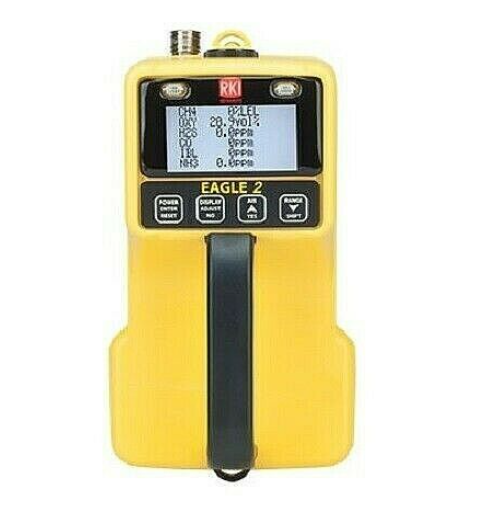
RKI 722-003 Eagle 2 Gas Monitor LEL&PPM / H2S USA Made Free Shipping
RKI Instruments 722-003 Eagle 2 Gas Monitor LEL&PPM / H2S USA MADE No Sales Tax Free shipping RKI factory to you Authorized worldwide RKI distributor This instrument is configured to monitor LEL & PPM / H2S Generally made and shipped by RKI within 5-7 business days or less.
-
Infrared (IR) CO2, % LEL CH4, % Vol. CH4, % LEL HC, % Vol. HC
-
Thermal Conductivity (TC) % Vol. H2, % Vol. CH4
-
Smart toxic, plug and play sensors NH3, AsH3, Cl2, HCN, PH3, & SO2
-
Hydrogen specific LEL / ppm sensor
- Powerful long-life pump up to 125’ range
- Low flow pump shut off and alarm
- Methane elimination for environmental use
- Alkaline 18 hours or NiMH 20 hours capability
- EPA Method 21 VOC Monitoring
- Internal hydrophobic dust filter
- External probe with hydrophobic filter
- Multilingual (5 languages)
- Ergonomic RFI / EMI / chemical / weather resistant enclosure
- Intrinsically safe design, CSA approval
- Datalogging standard
-
The EAGLE 2 is the solution for just about any portable gas monitoring situation. Equipped with features that are not available on competitive units, the EAGLE 2 is a powerful instrument that does more than just offer the standard confined space protection for LEL, O2, H2S and CO. The EAGLE 2 offers easy access to controls such as auto-calibration, alarm silence, demand zero, peak hold, and methane elimination. Each channel has two alarm levels plus TWA and STEL alarms for toxic channels. The two alarm levels are user adjustable and can be latching or self resetting.
The EAGLE 2 available features include a PID sensor for detecting high or low ppm levels (0-50 & 0-2,000) of VOC gases; % volume capability for CH4 and H2 using a TC (thermal conductivity) sensor; PPM or LEL hydrocarbon detection at the push of a button; infrared sensors for CO2 (ppm or % volume), methane or hydrocarbons in LEL and % volume ranges; methane elimination feature for environmental applications; and a variety of super toxic gases. The EAGLE 2 has a strong internal pump with a low flow auto pump shut off and alarm, which can draw samples from up to 125 feet. This allows for quick response and recovery from distant sampling locations. The EAGLE 2 will continuously operate for over 18 hours on alkaline batteries or 20 hours on NiMH. A variety of accessories are also available to help satisfy almost any application such as long sample hoses, special float probes for tank testing, and dilution fittings, just to name a few. Data-logging is a standard feature for all sensors on all versions.
The Eagle 2 is ideal for performing EPA Method 21 fugitive emission monitoring of VOC leaks from process equipment.. EPA Method 21- Determination of Volatile Organic Compound Leaks, is a test method used for the determination of leaks of VOCs from process equipment. The Eagle 2 meets the requirements for portable instruments used for this purpose as outlined in Sections 6 and 8 of Method 21.
-
IMPORTANT NOTICE: METHAMPHETAMINE LABORATORIES CUSTOMER TYPE: Police Departments, Drug Task Force Agents, Fire Departments APPLICATION DESCRIPTION: Methamphetamine is a highly addictive stimulant that is commonly referred to by users as meth, speed, crank, or ice. For the user it causes increased activity, decreased appetite, a sense of euphoria, and in some cases violent behavior. Meth has become an increasingly popular drug over the past several years and has developed into a poor man’s cocaine. It’s cheaper to buy, easier to make, and provides a longer lasting high. With a simple recipe, which is readily available off of the internet, an amateur with little to no chemical background can easily create their own makeshift meth lab. These makeshift meth labs put enforcement agents and response teams at risk and in need of gas monitoring equipment. Meth labs don’t require much space and can be found in a variety of isolated places like apartments, cheap motels, mobile homes, farms, or even vehicles. Fumes from the lab can be toxic for long periods by penetrating surrounding furniture, carpet, and walls. The simple chemicals used to make methamphetamines are relatively harmless by themselves, but during the “cooking process” the mixture can be unstable giving off toxic fumes and creating a potentially flammable and explosive situation. Hydriodic acid, red phosphorus, and anhydrous ammonia are typically the most dangerous chemicals used which can generate toxic levels of phosphine and ammonia gas during the cooking process. In addition to being toxic, red phosphorus is also flammable and explosive if exposed to an ignition source. To make matters worse, the post-manufacturing phase also generates a large volume of hazardous waste. Generally one pound of finished meth will produce five to six pounds of hazardous fluids. These conditions, combined with any booby traps used to protect the meth lab, can be extremely dangerous for any law enforcement agent or response team forced to enter the area. RKI’S SOLUTION: RKI offers the EAGLE 2 portable sample-drawing gas monitor that can simultaneously detect for phosphine and combustibles at either low ppm or % LEL levels. The instrument can also be configured with one to six different gases which can include combustibles, oxygen, carbon monoxide, phosphine, and ammonia just to name a few. The EAGLE 2 is equipped with a superior catalytic sensor that makes it capable of monitoring ppm or % LEL levels of combustible gases. By simply pushing one glove friendly button, the display instantly changes from the % LEL range to the ppm range to detect trace amounts of combustible gases. The EAGLE 2 also has the capability of detecting a wide range of super toxic gases including phosphine and ammonia. Having a single portable instrument is a great advantage to a police officer, drug enforcement agent, or fire department in determining the toxicity or flammability of a meth lab before any personnel enters the area. The Eagle 2 can also be equipped with a high-sensitivity photoionization detector (PID) for detection of volatile organic compounds (VOCs) at low levels. This function is useful for detection of solvents used in meth production, as well as for detection of accelerants used for arson. EQUIPMENT NEEDED: We offer many versions of the EAGLE 2, which can be customized in terms of the sensors included, for law enforcement agencies. Listed below are some of the more common EAGLE 2 configurations which can be used. Please consult us for other combinations.
-
722-001 . LEL & PPM Hydrocarbons/O2
-
722-005 . LEL & PPM Hydrocarbons/O2/PH3
-
725-028 .LEL & PPM HC/O2/CO/PH3/NH3
-
723-101-P2.LEL & PPM HC/O2/0-2000ppm VOCs
-
724-128-P2.LEL & PPM HC/O2/0-2000ppm VOCs/PH3
-
726-124-P2.LEL & PPM HC/O2/0-2000ppm VOCs/CO/PH3/NH3
-
If you need a configuration or any RKI product or accessory not shown on this site, just let us know and we will add itLIFE PROTECTORS AND SHEPARD SAFETY PRODUCTS IS AN AUTHORIZED WORLDWIDE FULL DISTRIBUTOR FOR ALL RKI PRODUCTS. UNITS AND SENSORS HAVE A SHELF LIFE SO WE DO NOT STOCK AND WAIT FOR ORDERS. YOUR ORDERS ARE SENT TO RKI IMMEDIATELY SO THEY CAN SHIP DIRECTLY TO YOUR DOOR. THAT WAY YOU WILL ALWAYS RECEIVE THE FRESHEST ITEMS. THESE ARE LIFE SAVING DEVICES AND WE WOULD DO IT NO OTHER WAY. IF ANY QUESTIONS PLEASE DO NOT HESITATE TO CONTACT US..
-
Gases & Detectable Ranges
The EAGLE 2 can be configured with up to 6 gas sensors from the list below.
Gas Measuring Range Accuracy * Which ever is greater Gases & Detectable Ranges Standard Confined Space Gases Hydrocarbons (CH4, std) 0 – 100% LEL ± 5% of reading or ± 2% LEL (*) 0 – 5% Vol. (CH4) 0 – 50,000 ppm ± 50 ppm or ± 5% of reading (*) Oxygen (O2) 0 – 40% Vol. ± 0.5% O2 Carbon Monoxide (CO) 0 – 500 ppm ± 5% of reading or ± 5 ppm CO (*) Hydrogen Sulfide (H2S) 0 – 100 ppm ± 5% of reading or ± 2 ppm H2S (*) Toxics Ammonia (NH3) 0 – 75 ppm ± 10% of reading or ± 5% of full scale (*) Arsine (AsH3) 0 – 1.5 ppm Chlorine (Cl2) 0 – 3 ppm Hydrogen Cyanide (HCN) 0 – 15 ppm Phosphine (PH3) 0 – 1 ppm Sulfur Dioxide (SO2) 0 – 6 ppm IR Sensors Carbon Dioxide (CO2) 0 – 10,000 ppm 0 – 5% Vol. 0 – 60% Vol. ± 5% of reading or ± 2% of full scale (*) Methane (CH4) 0 – 100% LEL/ 0 – 100% Vol. Hydrocarbons 0 – 100% LEL/ 0 – 30% Vol. PID Sensors VOC 0 – 2,000 ppm 0 – 50 ppm — TC Sensors Methane (CH4) 0 – 100% Vol. ± 5% of reading or ± 2% of full scale (*) Hydrogen (H2) 0 – 10% Vol. 0 – 100% Vol. Hydrogen Specific Hydrogen (H2) 0-100% LEL 0-40,000 ppm ± 5% of reading or ± 2% of full scale (*)






